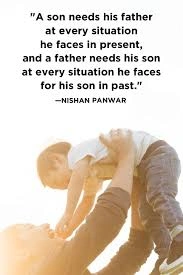Welcome to (International Stories). In this story, we will discuss A man’s wife died at the age of forty Interesting story. I hope you will like this story.
A man’s wife died at the age of forty Interesting story
A man’s wife died at the age of forty. When his friends and relatives suggested a second marriage, he responded that his wife’s greatest gift was a son, and she was with him. Life will be lived.
Training up my son
When the son grew up, he entrusted all his business responsibilities to him. He often spent time in his office or in a friend’s office.
The feeling of loneliness
After his son’s wedding, the man began to feel more lonely. He gave complete control of his home to his daughter-in-law.
One day event
One year after son’s marriage, he was eating lunch when son also came from office. He was washing his hands and getting ready to eat. The son heard that father asked for yogurt after eating, so the wife replied that today at home. No yogurt.
After eating, the father went out for a walk. After a while, the son sat down to have dinner with his wife. There was yogurt in the pot, but the son ate without any reaction and then went back to the office.
Amazing news
A few days later, the son said to his father, “You have to go to court today and you’re getting married! “The father looked at his son in amazement and said, “”Son!” I don’t need marriage anymore, and I love you so much and you don’t need mother anymore, so why my remarry? ”
Revealing the truth.
The boy replied, “Dad, I’m not bringing my mother for you, nor a mother-in-law for my wife!” I’m arranging yogurt just for you! From tomorrow, I will be living with your daughter-in-law in a rented house and I work as a servant in your office. So, that your daughter-in-law knows your worth.
Importance of parents
This story teaches us that parents can be ATM cards for us, but they do not follow our will but we follow their will. Long live all the parents in the world! Such ideal practices should be adopted in every home…
Relationship between father and son
The relationship between a father and son is a profound and multi-faceted bond that can deeply influence both their lives. While each relationship is unique and shaped by the personalities, circumstances, and cultural backgrounds of the individuals involved, there are several key components that typically define a healthy father-son relationship:
1. Mutual Respect
Respect is the cornerstone of any meaningful relationship, and this is especially true for fathers and sons. A father should respect his son’s individuality, allowing him the freedom to explore his identity, interests, and values. In return, the son should respect the father’s experience, guidance, and efforts to nurture him. Mutual respect fosters open communication and reduces the chances of conflict.
2. Guidance and Mentorship
Traditionally, fathers are seen as role models and mentors, providing their sons with life lessons, values, and practical skills. A father can teach his son the importance of hard work, integrity, responsibility, and resilience. This guidance should evolve with the son’s growth, moving from more directive teaching when the son is younger to collaborative problem-solving and advice as the son matures into adulthood.
3. Emotional Support and Understanding
It’s important that a father is emotionally available to his son. In many cultures, fathers have historically been seen as providers or disciplinarians rather than emotional figures. However, a strong father-son relationship requires emotional openness. Sons should feel comfortable sharing their feelings, fears, and struggles without fear of judgment or ridicule. Similarly, fathers should express their own vulnerabilities, showing that it’s okay to be emotionally expressive.
4. Trust and Dependability
Trust is another vital element. Sons often look to their fathers for protection and security, and this sense of safety extends beyond physical needs to emotional and psychological well-being. A father should be dependable, showing that he is someone his son can count on for guidance, help, or just as a supportive presence.
5. Shared Experiences and Bonding
Fathers and sons often bond through shared activities. This can range from hobbies like sports, fishing, or working on projects together to intellectual pursuits such as discussing books, films, or philosophy. These shared experiences can help create lasting memories and foster deeper connection. Bonding is not just about the activity itself but the time spent together and the communication it fosters.
6. Encouraging Independence
A healthy father-son relationship allows the son to develop autonomy. Fathers should provide a balance of guidance and freedom, helping their sons grow into independent and confident individuals. This requires letting go of control as the son matures, supporting his decisions even when they differ from the father’s expectations or beliefs. Encouraging independence also means allowing space for failure and learning from mistakes.
7. Navigating Conflict
Conflict is natural in any close relationship, including between fathers and sons. What’s important is how they navigate disagreements. A healthy relationship involves constructive conflict resolution, where both parties listen, express their viewpoints, and work toward understanding each other. Fathers should avoid overly authoritarian approaches and instead aim for a balance of authority and empathy.
8. Role in Identity Formation
Fathers play a significant role in shaping their sons’ sense of identity. Sons often look to their fathers for cues about what it means to be a man, how to handle challenges, and how to relate to the world. Whether through emulation or by contrasting with their fathers, sons often define parts of themselves in relation to their fathers’ beliefs, attitudes, and behaviors.
9. Support Through Life Stages
The father-son relationship is dynamic and evolves over time. During childhood, a father’s role may be more protective and authoritative, but as the son grows into adulthood, the relationship may become more egalitarian. In later years, the roles can even reverse, with sons providing support and care for their aging fathers. Understanding that this relationship will shift over time can help both father and son adapt to new phases with grace and understanding.
10. Legacy and Values
Fathers often wish to pass down their values, traditions, and wisdom to their sons. This could involve cultural, spiritual, or personal beliefs that the father feels are important. A strong father-son relationship includes space for sharing this legacy while allowing the son to adapt or reinterpret those values to fit his own life.
Challenges and Barriers between father and son
Despite the ideal dynamics, father-son relationships can face challenges such as communication barriers, differing expectations, or unresolved emotional issues. In some cases, societal norms about masculinity may discourage emotional closeness, making it harder for fathers and sons to connect on a deeper level. It is important to recognize these barriers and actively work to overcome them through patience, effort, and sometimes professional support if needed.
The father-son relationship is one of mutual growth, learning, and connection. When built on respect, trust, emotional openness, and shared experiences, it can be a source of immense strength, guiding both father and son through life’s many phases. Nurturing this bond requires intentional effort, but the rewards in terms of personal fulfillment, legacy, and emotional well-being are profound.
CONCLUSION:
FAQ:
Why did the father feel lonely after his son’s marriage?
After his son’s marriage, the father felt lonely because he handed over all the responsibilities of the home to his daughter-in-law, leaving him with less involvement in daily affairs. This, combined with his growing distance from his son, contributed to his sense of isolation.
What did the father ask for during lunch, and what was the daughter-in-law’s response?
The father asked for yogurt after lunch, but the daughter-in-law replied that there was no yogurt available at home.
What did the son discover later that same day?
Later that day, the son discovered there was yogurt in the house when he sat down to have dinner with his wife. However, he chose not to react at that moment.
Why did the son ask his father to go to court for remarriage?
The son made this unusual request to emphasize the value of his father. He wanted to show his father that his decision was not about finding him a new wife or a mother-in-law for his wife, but about ensuring his father’s comfort and respect. He also wanted to make his father realize the importance of his role in the family, not as someone to be neglected.
What did the son plan to do after confronting his father about the yogurt situation?
The son planned to move out with his wife into a rented house, leaving his father’s home to live a simpler life. He also planned to work as a servant in his father’s office, which symbolized his desire to learn the value of hard work and responsibility, just as his father had done.
What is the key moral lesson in this story?
The story highlights the importance of respecting and valuing parents. It teaches that parents are not just there to fulfill our needs like ATM cards, but they deserve our respect, care, and obedience. The story encourages adopting practices that honor parents and their sacrifices rather than neglecting or taking them for granted.
How does the son’s final action reflect the lesson of the story?
The son’s final action of leaving the house and taking up a servant’s position in his father’s office demonstrates humility and a willingness to learn the true value of family. It reflects his understanding that the role of parents is irreplaceable and that the responsibility of caring for them is a significant part of life.



I truly appreciate your technique of writing a blog. I added it to my bookmark site list and will
Very well presented. Every quote was awesome and thanks for sharing the content. Keep sharing and keep motivating others.
Very well presented. Every quote was awesome and thanks for sharing the content. Keep sharing and keep motivating others.